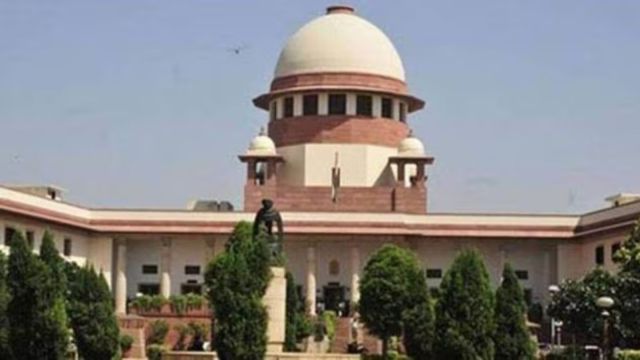Felling of trees in Delhi’s Ridge area: SC holds DDA officials guilty of contempt, criticises ‘administrative overreach’
The Supreme Court directed the guilty officials to pay Rs 25,000 each as environmental fee, but closed the contempt proceedings against former DDA vice-chairman Subhashish Panda.
 The top court also asked the DDA to impose a one-time levy on affluent persons residing in the Ridge area who benefitted from the widening of the road.(File Photos)
The top court also asked the DDA to impose a one-time levy on affluent persons residing in the Ridge area who benefitted from the widening of the road.(File Photos)Terming it “yet another classic case of institutional missteps and administrative overreach,” the Supreme Court on Wednesday held that there was “wilful disobedience” by former Delhi Development Authority (DDA) Chairman Subhashish Panda and other officials “resulting in contempt of” its “orders” in the matter of widening of the road to the under-construction Central Armed Police Forces Institute of Medical Sciences (CAPFIMS) in the Capital’s Ridge area.
The case had picked up steam last year following allegations that the felling took place after the visit of Delhi Lieutenant Governor V K Saxena to the site, implying that he may have had knowledge of the same.
In an affidavit, however, the
L-G had earlier said that during the visit, “no one present at the said site… brought to the notice of the deponent, the legal requirement of obtaining permission from this Hon’ble Court for felling of trees.”
The top court’s judgment by a bench of Justices Surya Kant and N K Singh, however, said, “It is an admitted position that” Panda “and officials of the DDA acted in an errant manner, which not only amounted to a concealment of this court’s directions but also led to an unfortunate and avoidable misconstruction of communications attributed to the L-G, thereby placing him in an embarrassing position. There can thus be no second opinion but to answer the issue in the affirmative and hold that there was indeed wilful disobedience on the part of the respondents, resulting in contempt of this court’s orders.”
The SC spared Panda of any action and closed the contempt proceedings against him “since” he “was not an officer in the DDA cadre and is no longer holding any position in that organisation…”
It directed the other respondents and officials of DDA, found responsible by the internal inquiry for the acts leading to the contempt, to deposit a sum of Rs 25,000 each as an environmental fee with the Forest Department. The court made it clear that this shall be in addition to, and without any prejudice, the departmental action that may be taken against them.
This sum, said the court, can be utilised towards remedial measures sought to be undertaken, to compensate for the loss of forest cover. The bench directed that “additionally, a formal penalty of censure be imposed upon all such officials,” and closed the contempt proceedings against the respondents.
The court, while taking stern exception to the environmental harm caused by “the reckless decimation of a substantial” number of trees, resulting in loss of biodiversity, also acknowledged the significance of the hospital project to the lives of families of personnel belonging to the lower ranks of the paramilitary forces.
“We are of the considered view that such individuals, who remain largely voiceless and without representation in proceedings such as the present one, stand to benefit directly from the construction of an improved approach road to CAPFIMS. Better road access would enable emergency vehicles, including ambulances, to reach the facility swiftly, thereby potentially saving the lives of those who routinely safeguard ours. In the discharge of our judicial function, this overarching public interest weighs heavily upon the conscience of this court,” it said.
The court said that “the establishment of CAPFIMS, the felling of trees, and the construction of approach roads are now fait accompli. While it may be theoretically possible to contemplate a reversal of these actions, such a course is practically untenable. In our view, the die is cast, and what is done cannot now be undone — any refusal to put institutions like CAPFIMS to optimal use or to undo road construction at this stage risks not only undermining public interest but also squandering significant public resources.”
The court issued a series of directions, including compensatory afforestation, to make up for the felling.
Decrying the tree felling exercise, the court said, “The facts before us reveal a troubling pattern: permissions not obtained, court orders ignored, and environmental degradation inflicted with impunity. Such actions certainly raise fundamental concerns about governance and accountability. We truly hope that these proceedings have been conducive to incorporating necessary course corrections by the DDA and other bodies to avoid any such lapses in the future.”
The judgment said “it is only the overwhelming public interest served by the establishment of CAPFIMS that has, in effect, overshadowed the sheer administrative incompetence and blatant disregard for both established procedures and compelled it to take a not so stringent stance”.
The court, however, added, “It must be unequivocally stated that any recurrence of such conduct will not be met with similar indulgence.”
It also directed the DDA “that henceforth, every notification or order relating to afforestation, road construction, tree felling, or any activity with potential ecological impact must explicitly mention the pendency of relevant proceedings before this court. This direction is being issued to ensure that, in the future, the plea of ignorance is not taken as a defence.”







